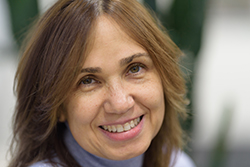

Rayette Sterling
Alaska Humanities Forum
Tell us a bit about yourself, the organization you represent, and the work you do.
I am a board member and past chair of the Alaska Center for the Book, an all-volunteer state affiliate of the Center for the Book. ACB is unique in that we are an independent all volunteer non-profit organization. We have no building, and no paid staff. Just a dedicated group of individuals committed to promoting and supporting literature and literacy in Alaska.
I work at the Alaska Humanities Forum, the state affiliate of the NEH. The Alaska Humanities Forum is dedicated to strengthening and connecting communities across Alaska. Using the humanities—literature and storytelling, history, art, music, philosophy, our shared cultural heritage—we create the space for Alaskans to share their stories, ideas, and experiences so that they may better understand themselves, one another, and the human experience. In my role as Leadership Programs Manager, I lead the Leadership Anchorage Program.
Tell us about your community/the communities you serve, and your part of the country.
Both ACB and AKHF are statewide organizations serving Alaska. Alaska has a population of 739,795 souls spread across an area more than twice the size of Texas. Our communities are diverse and unique—many of them are off the road system, including Juneau the state capital, accessible only by air or navigable rivers. Alaska is also home to a sizable military and veteran community.
What did it mean to you and your community to host the U.S. Poet Laureate?
Because of our remoteness, Alaska is not often on the speaking rotation for major authors. It was a privilege to have the opportunity to share the beauty of our communities with Tracy. I think Alaskans are connected to land and place in a unique way. Our environment informs us and shapes how we move through the world. Poetry provides a way to articulate that movement and capture its essence. Seeing the seniors at the Palmer Pioneer Home and the students in Bethel engage with the readings was inspiring. Although the communities are very different, we were able to connect through poetry to have an American conversation.
Can you share any feedback you received from event attendees/participants?
One of the truly special moments was at the Pioneer Home. A few of the residents are non-verbal, yet they clapped and participated in the conversation.
What, if any, type of literary programming do you present in your community? How did this program fit in?
The Alaska Center for the Book sponsors literary events throughout the state, including Alaska Reads, a book program highlighting the work of a living Alaska author. Part of the program includes an author tour of the state. The American Conversations program was a wonderful addition. Our state is so large and parts quite remote. It is difficult to provide statewide programming. Having Tracy visit allowed us to do more outreach to rural Alaska.
The Alaska Humanities Forum supports literary programming through grants as well as hosting community conversations that use arts, film, literature as a springboard.
